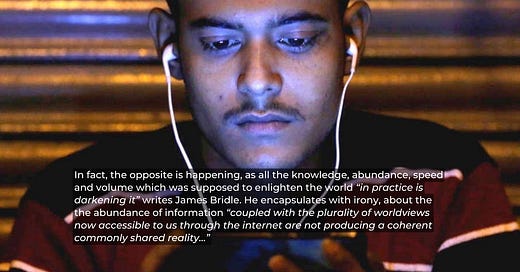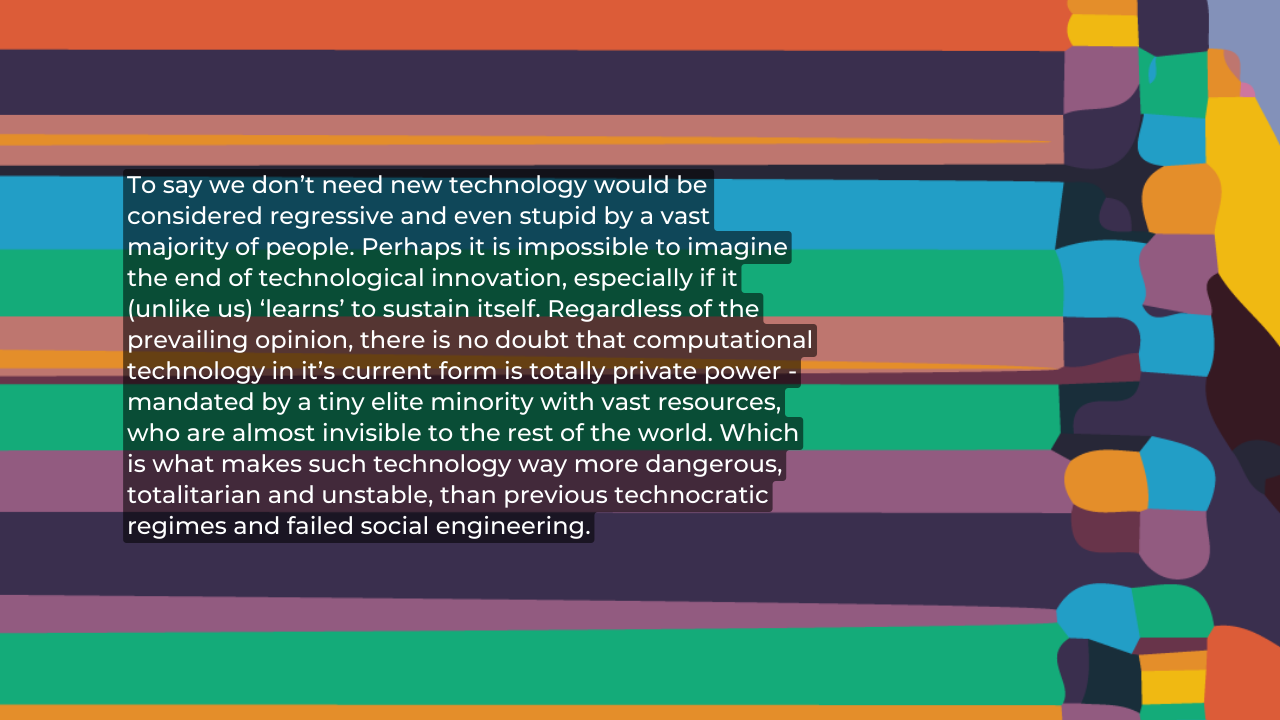More information, leads to better decisions...
or does it actually? And for who and what purpose?!
Technology and it’s constant innovation, speed, complexity and proliferation is ‘complicit’ in the biggest problems and challenges we face today. An out-of-date economic system - the collapse of earlier political / societal structures - ever widening gap between rich and poor - rise of nationalism, ethnic conflicts, racism and online shadow wars - and to top it all, climate change and global warming as the biggest ‘existential threat’ we all face. By ‘complicit’ I wish to posit, that technological progress does not merely ‘augment’ our skills and abilities, but eventually shapes, directs and even owns them, for better and for worse. We have entered an age, ushered in by high-modernist technology, where information is the “new oil”. However the emerging specter of vast information highways and how we navigate within them, reveal structural flaws, shape-shifting behavior and utterly dismal if not horrific outcomes. The enlightened mantra - “more information = more knowledge = better decisions” always elicits high hopes, however most often comes at tremendously high cost, detrimental to us in various ways seen and unseen.
Across nations, the response and solution to our weak understanding of technology is technological education. Does not matter if you are a farmer, fisherman, photographer, musician, factory worker, scientist, policy maker, shopkeeper, delivery boy or what-job-have-you, technical education is there for us all. My parent’s generation pegged their lofty hopes on us, based on the same benchmark. As an example, teenagers and young people are encouraged allover the world to learn to code, to harness the “wonders of information technology”. Championed again and again, by politicians, technologists, pundits, policy makers and business leaders, enabling a nakedly functional and pro-market society: which the information economy actually needs. A coder or systems analyst or plumber or music producer maybe technically educated, about the functional aspects of their given systems, but willy nilly insufficient and or “always trying to catch up” as one type of technology renders the previous one obsolete. Professionally speaking, we are then in fact engaged is various types of ‘Solutionism’. A woke buzzword from the mid-90s, solutionism however deficient in construct, is also one of the pillars of ‘computational thinking’ (old daddy of Artificial Intelligence).
Computational thinking, at an unconscious level, surmises that the world can be understood better and better, if we have all the information necessary in order to make the best possible decisions. The pundits and technocrats advocate (often without any real evidence) that the ‘richness of information’ makes us more literate and wiser. However in reality, vast aspects of the natural world, systems created by nature, including our own existence, in terms of functionality and behavior, cannot be mapped or made sense of by mere computational thinking. The world simply cannot be deciphered (nor so easily mimicked) by a set of processes, formulas, steps, algorithms and deductions. Did we become better decision makers because of information technology or did a vast set of superior machines, computation, processing and policies replace the previous order? As individuals then, we have little time or space, to care about the consequences of such high-modernist technological education. Does computational thinking serve us or the other way around?
Computational Thinking versus a coherent commonly shared reality?
In his book ‘The New Dark Age’ author and artist James Bridle, challenges information technology with brave and new insights. About the downside of “new technologies, that are presented as inherently good or emancipatory”. He argues all such technologies, for decades have been the outcome of computational thinking - “of which we are all guilty”. James Bridle stands out for saying “Technology is and can be a guide and helpmate in thinking. Computers are not here to give us answers, but are tools for asking questions.” He warns further that “those of us who have been early adopters and cheerleaders of new technologies, who have experienced their manifold pleasures and benefited from their opportunities, and who have consequently argued, often naively, for their wider implementation, are in no less danger from their uncritical deployment…” In this spirit, we find ourselves today connected to vast repositories of knowledge, information, text, images, sounds and what-all-else-digitized. But have we learned any better to think? Make better decisions? If we look around the world today, the answer would be negative. In fact, the opposite is happening, as all the knowledge, abundance, speed and volume which was supposed to enlighten the world “in practice is darkening it” writes James Bridle. He encapsulates with irony, about the the abundance of information “coupled with the plurality of worldviews now accessible to us through the internet are not producing a coherent commonly shared reality…” Oh! but, isn’t this is also the age of “post truth” and the “woke”. Techno serfdom!
In her private journal, circa 1915, Virginia Woolf wrote, “the future is dark, which is the best thing the future can be, I think.” What did she actually mean? Sort of an “extraordinary declaration” (Rebecca Solnit) that the ‘unknown’ need not be turned into the ‘known’ through false divination, deductive logic and use of technology. Decades later, scientist and sci-fi author Donna Haraway urged us to view technology not as mere tool making and tool use, but also “as the making of metaphors”. Hers was not an argument against technology, because to do so would also equate to argue against ourselves. Technology which frames our waking reality, so powerful and invasive, that new metaphors need to be invented for it all the time. Something so pervasive can also be potentially catastrophic, as well as expose our inability to comprehend the myriad and turbulent consequences of our own inventions (and decisions).
Computation systems often conflate approximation with simulation. For decades, high priests of computational thinking replaced the real world with flawed models of itself. The New Dark Age reveals in chapters, the consequences of such faulty or insufficient worlds, and how “the modellers and enablers assumed control of the world”. Little did they foresee, the superfluous consequences or wild outgrowth that occurred during the preceding decades. Much happened although as if invisibly!
Technology shape-shifts, not people!
Take the example of the super ambitious SAGE (Semi Automatic Ground Environment) built in 1966, by Western Electric, Boroughs Corp and the US military. A massive array of computers networking, assimilating data from hundreds of radars pinned around the world 24/7, into an “electronic brain" with the intent to detect any possible incoming aerial attack. Russians or Aliens, SAGE was supposed to “detect and protect”. Costing millions of dollars and an armada of scientists, the system (call it a humongous machine) was giant flop by all means. Contrary to it’s primary objective, the so called intelligence spewed out false alarms, summoning a bunch of panicky sweating generals and commanders to the ‘War Room’. Remember that period was also the height of the Cold War and global paranoia peaked with possibility of nuclear annihilation. SAGE was labelled as a failed project, regardless it would literally ‘shape shift’ in the next decade.
In it’s new avatar, the system was renamed ‘Semi-Automated Business Research Environment’ (SABRE) rebuilt by IBM, then at it’s zenith of privatized processing power (1970s). SABRE was perhaps the world’s first multitasking computation system to hit public access. Managing reservations for 24 airlines companies to constantly updating weather analysis to distributing real-time flight data, SABRE turned out to be a remarkably stable “electronic brain”. The mid-1970s also marks the beginning of global tourism and a sharp spike in consumer spending. SABRE at it’s heart was designed “to prevent commercial airlines from being accidentally shot down – a necessary component of any air defense system – pivoted to managing those same flights, buoyed by billions of dollars of defense spending” (The New Dark Age). But today SABRE connects millions of passengers, approximately 57,000 travel agents, 410 airlines, 90,000 hotels, 55 car rental companies, 370 tour operators and many railways, ferries and cruise lines. The global tourism industry is pivoted on something totally unseen and unfelt by public, however all thanks to computational thinking and military tech!
Technology and computational thinking, based on Cold War paranoia sits at the heart of the global tourism industry as well as millions of journeys made every year. SAGE and SABRE are just two examples amongst thousands, where we can see how consumer level computing systems, information technology, encryption, GPS and the internet actually links back to military power, privatized processing and trillions of dollars invested in defense research. After all, the internet is not some ‘magic carpet’. James Bridle sums up this clustered history of computational thinking very poignantly- “for everything that is shown, something is always hidden”. Something very similar in terms of the duality of technology, is happening across the internet and many of it’s emerging technologies such as Artificial Intelligence, Cryptocurrency, Metaverse, Cloud Computing and Storage. These are also literally ‘shape shifting’ towards the next epoch. And a vast majority of us desire even better technology, without a thought.
By the time you would have finished reading this story, your ‘digital cloud’ would have updated itself, even without you knowing about it. As our mobile phones become powerful general-purpose computers, computation literally disappears into almost every device around us, from home appliances to security cameras to navigation systems, the entire world begins to appear as code, digits, formulas, steps, algorithms, and deductions. A parallel universe of sorts, yet devoid of real life, where virtual learning machines are recording every possible event, current, place, person, vehicle, ship even birds and animals. For some folks nothing better has ever existed, yet f**k them for now.
To say we don’t need new technology would be considered regressive and even stupid by a vast majority of people. Perhaps it is impossible to imagine the end of technological innovation, especially if it ‘learns’ to sustain itself. Regardless of the prevailing opinion, there is no doubt that computational technology in it’s current form is privatized power - orchestrated by a tiny elite minority with vast resources, who are almost invisible to the rest of the world. Which is what makes such technology way more dangerous, totalitarian and unstable, than previous technocratic regimes and failed “social engineering”.
The benchmark of progress, central to 18th century Enlightenment tells us that “more knowledge = more information >> leads to better decisions”. We place that as bonafide practice in our daily life and also across intellectual, scientific, cultural and artistic pursuits. The line between information and technology is now blurred, not if erased by construct. This is the “age of information” after all. The age is also of narrow short term goals, not values, not the least set by us. And we are connected and enmeshed in technological systems every waking hour, and that as consequence shapes how we act and how we think. In many many cases, we simply cannot stand outside these systems nor can we ‘properly think’ without them.
Our collective inability to think outside computational systems, on a daily basis, makes these information corporations even stronger and totalitarian.
But can these marvelous new systems think for us? Sure and how! 2014, “austerity nostalgia T-shirts” rewritten by Amazon algorithms featured phrases like ‘Keep Calm and Rape A Lot’ and ‘Keep Calm and Knife Her’ and ‘Keep Calm and Kill Em All’. Thousands of such T-shirts were sold online, few hundreds even shipped, till public outrage forced Amazon to bring down the self-learning algorithm and the poor T-shirt company, ironically called “Carry On”. Just Artificial Stupidity right!?







